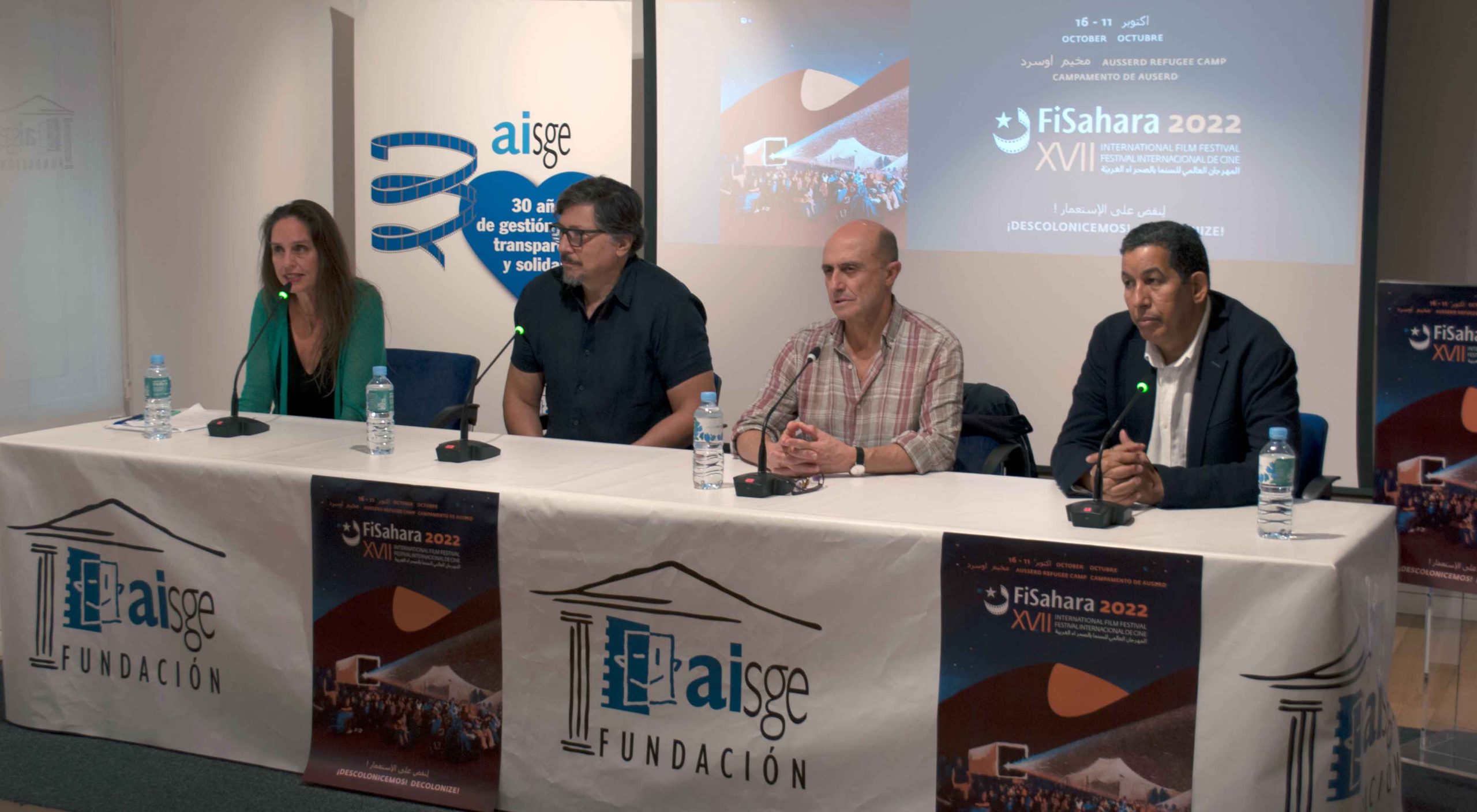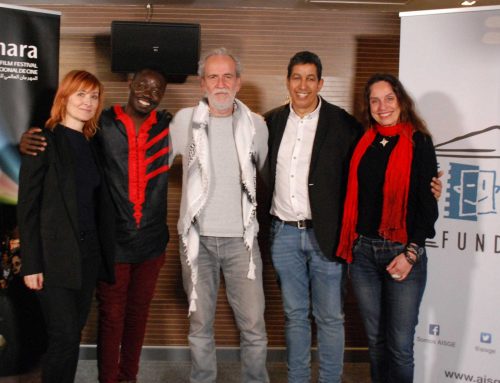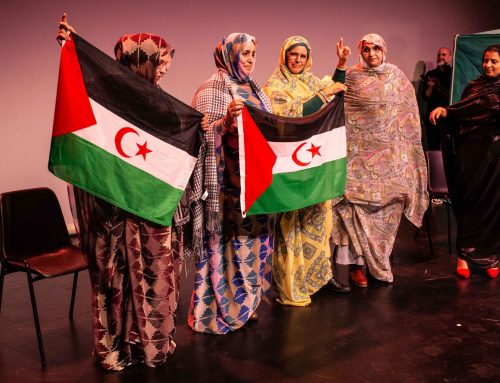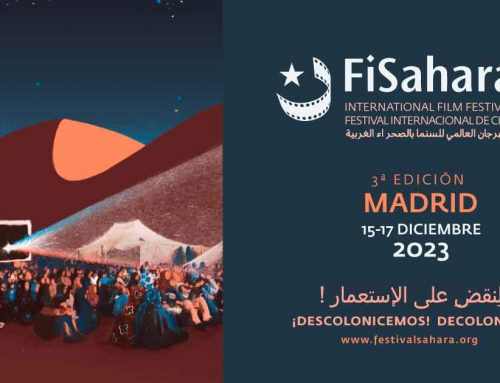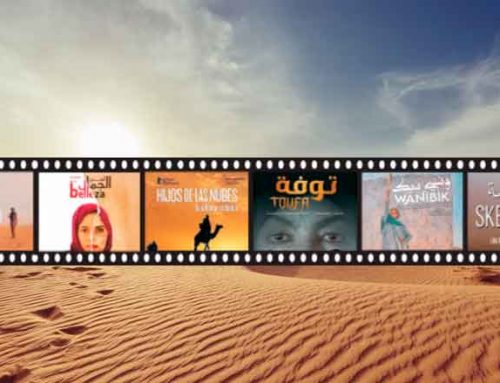After a prolonged interruption due to the pandemic and the return to war in Western Sahara, FiSahara (the Western Sahara International Film Festival) will finally celebrate an international edition this coming 11-16th of October — with guests, media and participants from many parts of the world joining thousands of Sahrawis in the Ausserd refugee camp (near Tindouf, Southwestern Algeria) for a week of screenings, roundtables and cultural celebrations. Decolonize! Sahrawi Film, Culture and Identity in Africa’s last colony, the festival’s 17 edition, is the cultural world’s rallying call for the international community to complete the liberation of Africa’s last colony, whose people have struggled against Spanish and Moroccan colonialism for over two centuries.
This year the festival’s special guests are legendary Sahrawis who first organized the resistance against Spanish colonial rule such as Embarka Brahim Bumajruta, in whose home the liberation movement was created, as well as women who built and ran the refugee camps during the 16-year war between the Polisario Front and Morocco such as educator Mariam Hmada, who was the Sahrawi Minister of Culture when FiSahara held its first edition in 2003. In the center of festival grounds, Sahrawi women will erect 12 giant tents or haimas to showcase the Western Sahara’s rich cultural legacy and celebrate its people’s unique identity.
Human rights defenders, filmmakers, cultural activists and legal advocates from Burkina Faso, Algeria, Colombia and many other places will travel to the festival to learn first-hand about the Sahrawi struggle for human rights and self-determination and share their own struggles against colonialism.
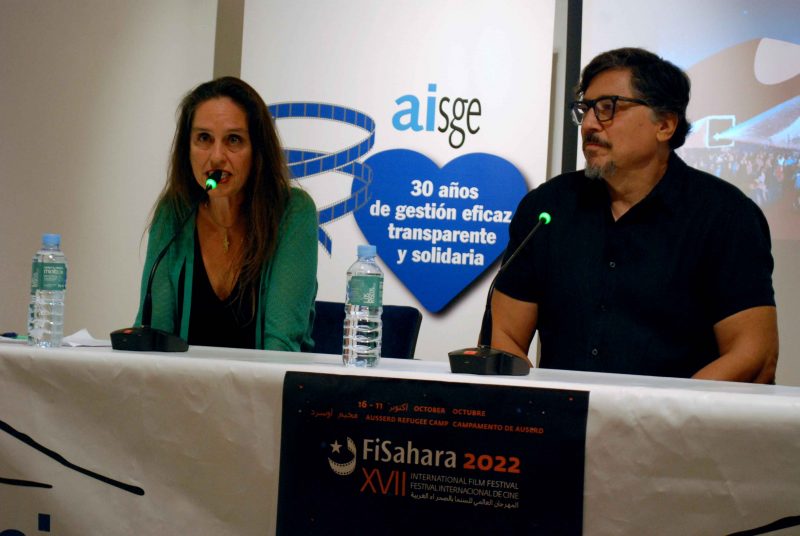
The executive director María Carrión along with the actor Carlos Bardem.
Among them Abdoullah Diallo, one of the most significant figures of cultural activism and journalism from Burkina Faso, leader in Le Balai Citoyen citizen movement that contributed to the fall of dictator Blaise Campaoré, as well as co-founder and coordinator of Ciné Droit Libre human rights film festival and the Norbert Zongo National Press Center, both beacons for democracy and freedom of speech. Algerian journalist and filmmaker Dorothée Kellou will present her film In Mansourah you Separated Us, the dramatic story of her father who, along with over two million Algerians, was forcibly displaced from his home by the French army during the Algerian War.
International human rights lawyer Tone Sørfonn Moe, who represents numerous Sahrawi political prisoners, will address human rights violations in Western Sahara, while Afro-Colombian feminist, journalist, activist and poet Emiliana Bernard from San Andrés Islands will talk about how cultural resistance is challenging Latin America’s colonial heritage, including white hegemony in power structures.
Spanish artists visiting the festival include actor and political activist Guillermo Toledo, actress Itziar Ituño (from the Netflix series Money Heist), the pop group Amaral, who will perform at the closing concert, as well as filmmakers who are traveling to present their works on Western Sahara.
“The Sahrawi people have adopted cinema as a tool for liberation and decolonization, in the tradition of filmmakers who confronted colonialist films by creating Third Cinema”, said Tiba Chagaf, Director of FiSahara. “Today our cameras capture and denounce the injustice committed by Morocco, Spain and the rest of the western world against our people, and through Sahrawi cinematography we tell our stories in our own words”.
FiSahara’s screens will light up with over twenty films, some focusing on colonialism and its disastrous legacy including in Western Sahara (Wanibik: The People who Live in Front of their Land by Rabah Slimani) Algeria (In Mansourah you Separated us by Dorothée Kellou), Palestine (Naila and the Uprising by Julia Bacha) and Burkina Faso (Burkinabè Rising: The Art of Resistance in Burkina Faso by Iara Lee).
The festival will also offer kids’ and family entertainment including animation films from Miyu Distribution as well as clown performances by Pallasos en Rebeldía.
The Sahrawi Film School as Centerpiece
The Abidin Kaid Saleh Audiovisual School, born from FiSahara’s film workshops in 2011, will screen half a dozen films made by students that address critical issues for Sahrawi youth such as addiction (Imminent Danger). Recipient this year of the San Sebastian Human Rights Film Festival award, the school is now at the center of FiSahara’s team, organizing not just the annual festival on the ground but also year-round film screenings and discussions throughout the camps with the Solar Cinema Western Sahara project. In 2022, the school also pioneered the first-ever Sahrawi sitcom Juruchu Fulucho (Follies in Exile) whose wildly popular episodes use humour to critique the idiosyncrasies of Sahrawi society.
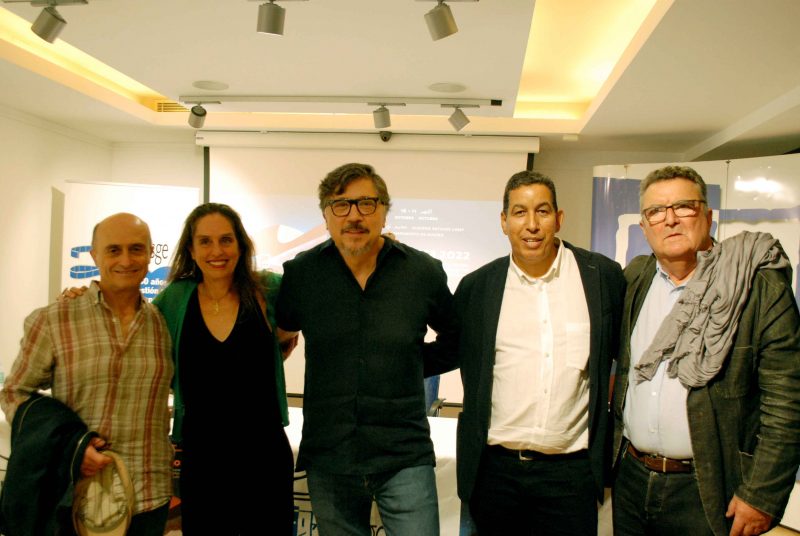
Pepe Viyuela, María Carrión, Carlos Bardem, Abdulah Arabi and Pepe Taboada.
Solidarity around the world
On September 11, the International Day of the Girl, FiSahara will partner with the Bubisher community library network in the camps to hold simultaneous screenings of The Neighborhood Storyteller by Alejandra and Francisco Alcalá, the story of a young woman refugee from Syria who was married at 16 and is using reading and storytelling to empower adolescent refugee girls and prepare them for a better future.
FiSahara will hold the world premiere of Little Sahara, a short film by Emilio Martí made with the drawings and stories of Sahrawi schoolchildren from the Pioneers school during a human rights film workshop. Some of the children will attend this special screening and the festival will connect live with Help Me Please, a solidarity arts and culture festival in Granada (southern Spain) whose activities this year are raising funds for the Sahrawi film school.
FiSahara opens dozens of windows in festivals around the world with screenings and debates, in particular through its partnership with the Human Rights Film Network, with almost 50 member festivals all over the world..
More than film
FiSahara will also offer its trademark parallel activities include roundtables, the Le Frig arts and culture festival entirely organized by Sahrawi women that showcases Western Sahara’s rich cultural heritage including food, dance, cooking, storytelling and art, a concert of traditional Sahrawi music held at sunset in the sand dunes, a football match between locals and visitors as well as opening and awards ceremonies, with a live white camel as prize for the winning film.
In a press conference held in Madrid prior to the festival, María Carrión, FiSahara’s Executive Director, said that, “this edition is very special, FiSahara has survived economic, health and, war crises … is indestructible and it is thanks to the support of the world of Culture.” Carrión has highlighted how “colonialism used cinema as a propaganda of its invasion and now it is the Sahrawi people who use it to demand its decolonization.”
Actor and writer Carlos Bardem, who has attended the festival twice and whose brother, the actor Javier Bardem, made a film on Western Sahara after returning from FiSahara, congratulated FiSahara “for its resilience and ability to resist everything and everyone, and for its ability to open a space to get the information focus on this injustice suffered by the Sahrawi people for decades.” Actor Pepe Viyuela, recalled how “FiSahara was the way I had to approach Sahrawi reality and since then I have not been able to disconnect from this cause.”
Abdulah Arabi, the representative in Spain of the Polisario Front, the Sahrawi liberation movement, has described FiSahara as “a tool for the Sahrawi people to denounce the injustice that suffers and claims the only possible solution, decolonization, as international law demands.”

